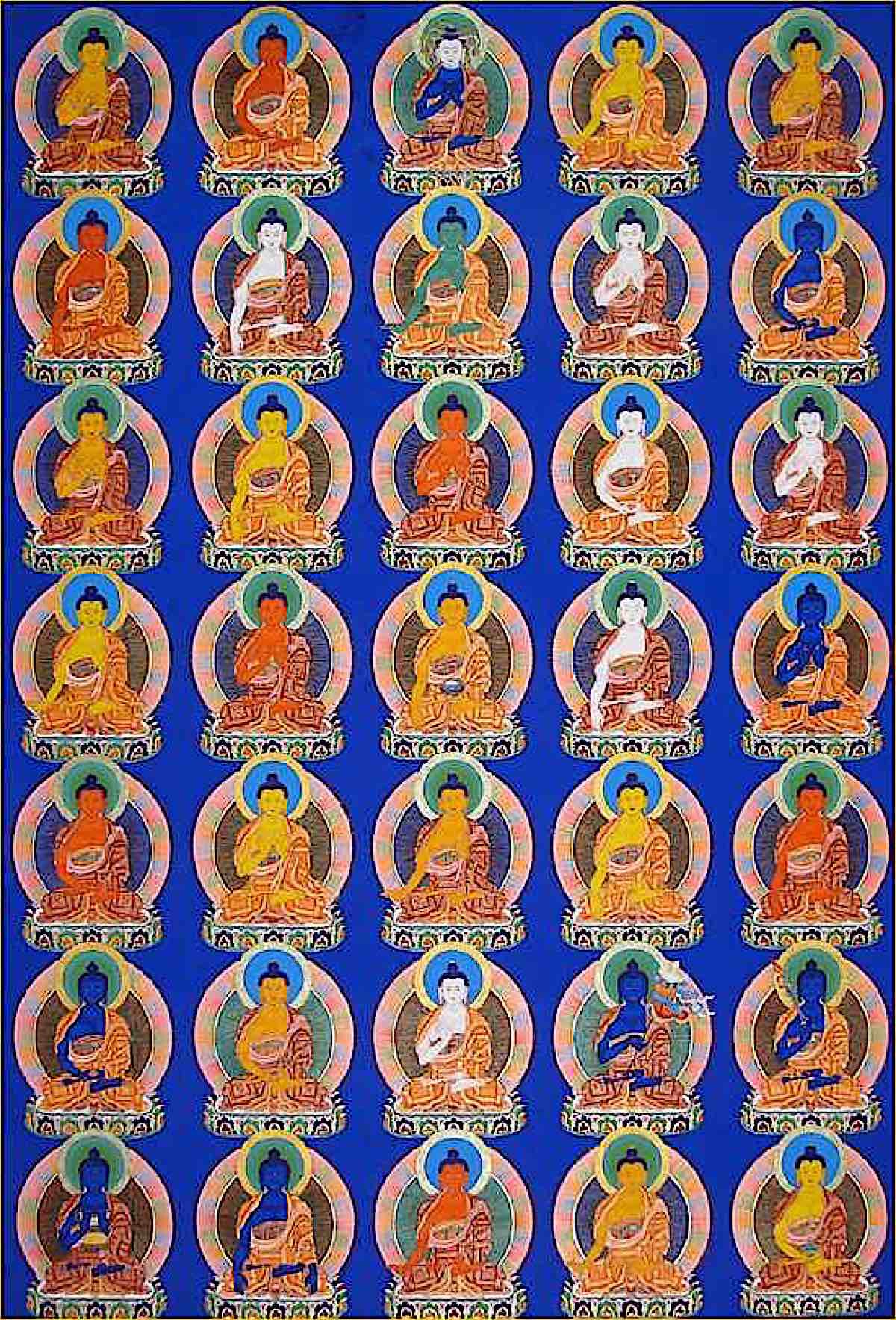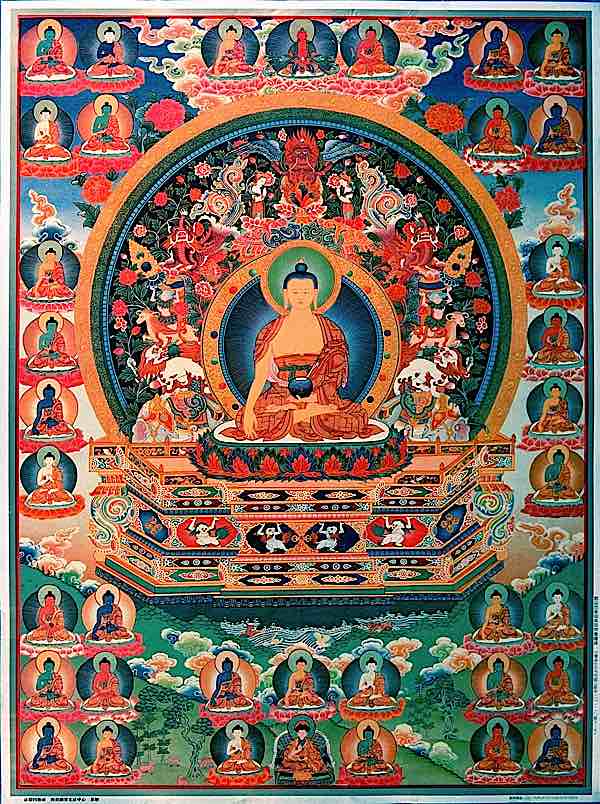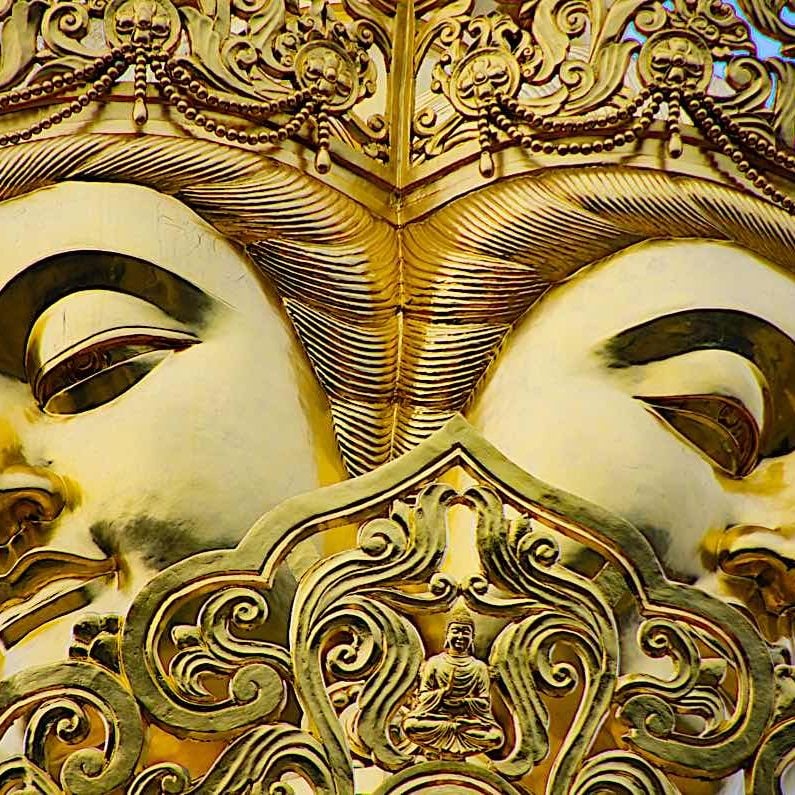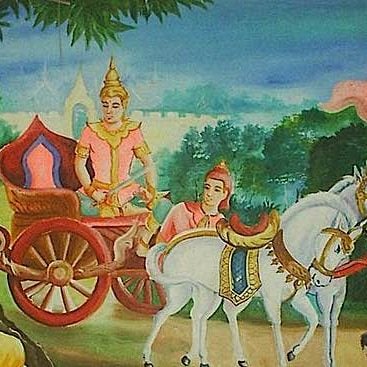Mahayana Sutra Of The Three Superior Heaps — now, is always the right time to confess downfalls and purify them
Venerable Thubten Chodren explains the importance of the Sutra of the Three Heaps, and why it should be part of everyone’s practice:
“There are a variety of purification practices, The Bodhisattva’s Confession of Ethical Downfalls being one of the most popular.
We all have done actions that we now feel badly about doing, and we have aspects of ourselves that we do not like and wish to change. Purification practices are excellent means to remove emotional burdens such as guilt, as well as to pacify the obstacles to our happiness and self-improvement created by the imprints of our destructive actions.

Guilt over past actions is useless, only leaving us feeling helpless and hopeless. On the other hand, acting to purify destructive imprints and afflictions is very productive. It helps us to change our bad habits and subdues obstacles to long life and success in our spiritual practice.
A complete purification practice consists of four opponent powers:
- The power of regret for having done the destructive action.
- The power of reliance: taking refuge, which restores our relationship with holy objects, and generating the altruistic intention, which restores our relationship with other sentient beings.
- The power of the remedial action, e.g. prostration, offering, reciting the names of the Buddha, reading or contemplating the Dharma, etc.
- The power of the promise not to repeat the action.
These four opponent powers are found in The Bodhisattva’s Confession of Ethical Downfalls, the Vajrasattva meditation, and other practices.” [1]
Full Sutra translated into English:
Mahayana Sutra Of The Three Superior Heaps
Namo:
The Bodhisattva’s Confession of Moral Downfalls
I, whose name is . . . , at all times go for refuge to the Guru, go for refuge to the Buddha, go for refuge to the Dharma, go for refuge to the Sangha.
To the Teacher, Blessed One, Tathágata, Foe Destroyer, Completely Perfect Buddha, Glorious Conqueror Shakyamuni I prostrate.
 To the Tathágata Complete Subduer with the Essence of Vajra I prostrate.
To the Tathágata Complete Subduer with the Essence of Vajra I prostrate.
To the Tathágata Jewel of Radiant Light I prostrate.
To the Tathágata Powerful King of the Nagas I prostrate. To the Tathágata Leader of the Heroes I prostrate.
To the Tathágata Glorious Pleasure I prostrate.
To the Tathágata Jewel Fire I prostrate.
To the Tathágata Jewel Moonlight I prostrate.
To the Tathágata Meaningful to Behold I prostrate.
To the Tathágata Jewel Moon I prostrate.
To the Tathágata Stainless One I prostrate.
To the Tathágata Bestower of Glory I prostrate.
To the Tathágata Pure One I prostrate.
To the Tathágata Transforming with Purity I prostrate.
To the Tathágata Water Deity I prostrate.
To the Tathágata God of Water Deities I prostrate.
To the Tathágata Glorious Excellence I prostrate.
To the Tathágata Glorious Sandalwood I prostrate.
To the Tathágata Endless Splendor I prostrate.
To the Tathágata Glorious Light I prostrate.
To the Tathágata Glorious One without Sorrow I prostrate.
To the Tathágata Son without Craving I prostrate.
To the Tathágata Glorious Flower I prostrate.
To the Tathágata Clearly Knowing through Enjoying Pure Radiance I prostrate.
To the Tathágata Clearly Knowing through Enjoying Lotus Radiance I prostrate.
 To the Tathágata Glorious Wealth I prostrate.
To the Tathágata Glorious Wealth I prostrate.
To the Tathágata Glorious Mindfulness I prostrate.
To the Tathágata Glorious Name of Great Renown I prostrate.
To the Tathágata King of the Victory Banner Head of the Powerful Ones I prostrate.
To the Tathágata Glorious One Complete Subduer I prostrate. To the Tathágata Great Victor in Battle I prostrate.
To the Tathágata Glorious One Complete Subduer Passed Beyond I prostrate.
To the Tathágata Glorious Array Illuminating All I prostrate. To the Tathágata Jewel Lotus Great Subduer I prostrate.
To the Tathágata Foe Destroyer, Completely Perfect Buddha, King of Mount Neru Seated Firmly on a Jewel and a Lotus I prostrate.
O All you [Tathágatas] and all the others, however many Tathágatas, the Foe Destroyers, the Completely Perfect Buddhas, the Blessed Ones there are dwelling and abiding in all the worldly realms of the ten directions, all you Buddhas, the Blessed Ones, please listen to me.
In this life and in all my lives since beginning-less time, in all
my places of rebirth while wandering in samsára, I have done negative actions, have ordered them to be done, and have rejoiced in their being done. I have stolen the property of the bases of offering, the property of the Sangha, and the property of the Sanghas of the ten directions, have ordered it to be stolen, and have rejoiced in it being stolen. I have committed the five unbounded heinous actions, have ordered them to be committed, and have rejoiced in their being committed. I have completely engaged in the paths of the ten non-virtuous actions, have ordered others to engage in them, and have rejoiced in their engaging in them.
Being obstructed by such karmic obstructions, I shall become a hell being, or I shall be born as an animal, or I shall go to the land of the hungry ghosts, or I shall be born as a barbarian in an irreligious country, or I shall be born as a long-life god, or I shall come to have incomplete senses, or I shall come to hold wrong views, or I shall have no opportunity to please a Buddha.
All such karmic obstructions I declare in the presence of the Buddhas, the Blessed Ones, who have become exalted
wisdom, who have become eyes, who have become witnesses, who have become valid, who see with their wisdom. I confess without concealing or hiding anything, and from now on I will avoid and refrain from such actions.
All you Buddhas, the Blessed Ones, please listen to me. In this life and in all my previous lives since the beginning-less time, in all my places of rebirth while wandering in samsára, whatever root of virtue there is in my giving to others, even in my giving a morsel of food to one born as an animal; whatever root of virtue there is in my maintaining moral discipline; whatever root of virtue there is in my actions conducive to great liberation; whatever root of virtue there is in my acting to fully ripen sentient beings; whatever root of virtue there is in my generating a supreme mind of enlightenment; and whatever root of virtue there is in my unsurpassed exalted wisdom; all of these assembled, gathered, and collected together, by fully dedicating them to the unsurpassed, to that of which there is no higher, to that which is even higher than the high, and to that which surpasses the unsurpassed, I fully dedicate to the unsurpassed, perfect, complete enlightenment.
Just as the Buddhas, the Blessed Ones of the past, have dedicated fully, just as the Buddhas, the Blessed Ones who are yet to come, will dedicate fully, and just as the Buddhas, the Blessed Ones who are living now, dedicate fully, so too do I dedicate fully.
I confess individually all negative actions. I rejoice in all merit. I beseech and request all the Buddhas. May I attain the holy, supreme, unsurpassed, exalted wisdom.
Whoever are the Conquerors, the supreme beings living now, those of the past, and likewise those who are yet to come, with a boundless ocean of praise for all your good qualities, and with my palms pressed together I go close to you for refuge.
NOTES
1 thought on “Mahayana Sutra Of The Three Superior Heaps — now, is always the right time to confess downfalls and purify them”
Leave a Comment
More articles by this author

Samantabhadra’s The King of Prayers is the ultimate Buddhist practice how-to and itself a complete practice

The Five Strengths and Powers or pañcabalā in Buddhism — the qualities conducive to Enlightenment: faith, energy, mindfulness, concentration and wisdom

Tara’s Great Dharani Supreme of all Mantras –with Music version– and the Sutra of Tara Who Protects from the Eight Fears: in Tara’s Own Words
Search
Latest Features
Please support the "Spread the Dharma" mission as one of our heroic Dharma Supporting Members, or with a one-time donation.
Please Help Support the “Spread the Dharma” Mission!

Be a part of the noble mission as a supporting member or a patron, or a volunteer contributor of content.
The power of Dharma to help sentient beings, in part, lies in ensuring access to Buddha’s precious Dharma — the mission of Buddha Weekly. We can’t do it without you!
A non-profit association since 2007, Buddha Weekly published many feature articles, videos, and, podcasts. Please consider supporting the mission to preserve and “Spread the Dharma." Your support as either a patron or a supporting member helps defray the high costs of producing quality Dharma content. Thank you! Learn more here, or become one of our super karma heroes on Patreon.
Lee Kane
Author | Buddha Weekly
Lee Kane is the editor of Buddha Weekly, since 2007. His main focuses as a writer are mindfulness techniques, meditation, Dharma and Sutra commentaries, Buddhist practices, international perspectives and traditions, Vajrayana, Mahayana, Zen. He also covers various events.
Lee also contributes as a writer to various other online magazines and blogs.
















The life-gving waters of spiritual illumination. Thank you. Maybe we should start with such a prayer every day? It reminds me of this passage from Rumis Mathnawi…
Water says to the dirty, “Come here.”
The dirty one says, “But I am so ashamed.”
Water says, “How will you be made clean without me?”
Rumi, Mathnawi II, 1366-7